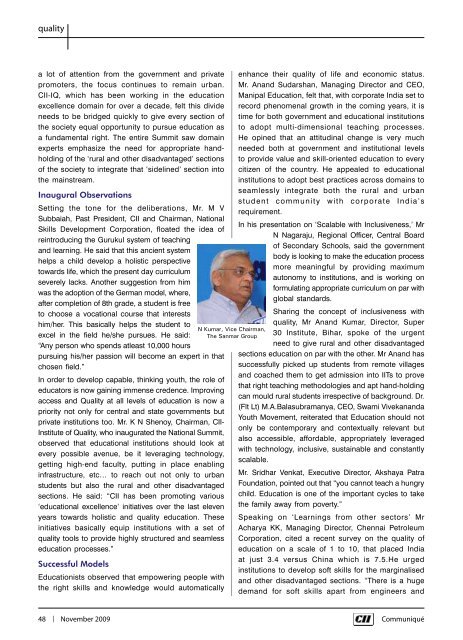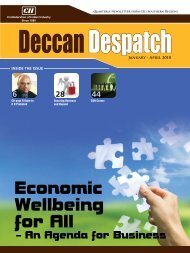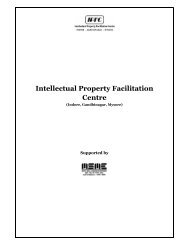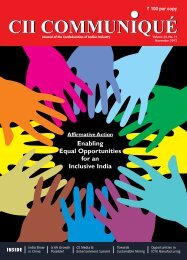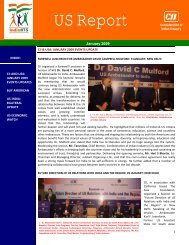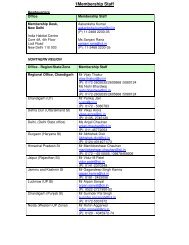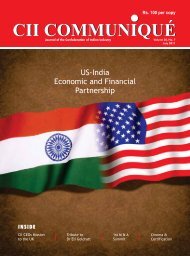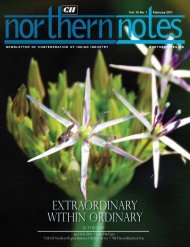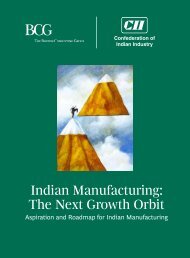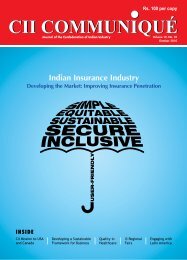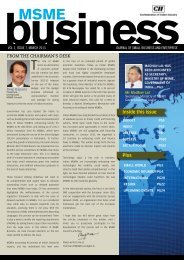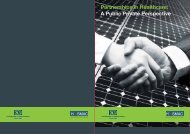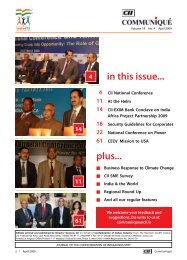Communiqué November 2009 | 1 - CII
Communiqué November 2009 | 1 - CII
Communiqué November 2009 | 1 - CII
- No tags were found...
Create successful ePaper yourself
Turn your PDF publications into a flip-book with our unique Google optimized e-Paper software.
qualitya lot of attention from the government and privatepromoters, the focus continues to remain urban.<strong>CII</strong>-IQ, which has been working in the educationexcellence domain for over a decade, felt this divideneeds to be bridged quickly to give every section ofthe society equal opportunity to pursue education asa fundamental right. The entire Summit saw domainexperts emphasize the need for appropriate handholdingof the ‘rural and other disadvantaged’ sectionsof the society to integrate that ‘sidelined’ section intothe mainstream.Inaugural ObservationsSetting the tone for the deliberations, Mr. M VSubbaiah, Past President, <strong>CII</strong> and Chairman, NationalSkills Development Corporation, floated the idea ofreintroducing the Gurukul system of teachingand learning. He said that this ancient systemhelps a child develop a holistic perspectivetowards life, which the present day curriculumseverely lacks. Another suggestion from himwas the adoption of the German model, where,after completion of 8th grade, a student is freeto choose a vocational course that interestshim/her. This basically helps the student toexcel in the field he/she pursues. He said:“Any person who spends atleast 10,000 hourspursuing his/her passion will become an expert in thatchosen field.”In order to develop capable, thinking youth, the role ofeducators is now gaining immense credence. Improvingaccess and Quality at all levels of education is now apriority not only for central and state governments butprivate institutions too. Mr. K N Shenoy, Chairman, <strong>CII</strong>-Institute of Quality, who inaugurated the National Summit,observed that educational institutions should look atevery possible avenue, be it leveraging technology,getting high-end faculty, putting in place enablinginfrastructure, etc… to reach out not only to urbanstudents but also the rural and other disadvantagedsections. He said: “<strong>CII</strong> has been promoting various‘educational excellence’ initiatives over the last elevenyears towards holistic and quality education. Theseinitiatives basically equip institutions with a set ofquality tools to provide highly structured and seamlesseducation processes.”Successful ModelsEducationists observed that empowering people withthe right skills and knowledge would automaticallyN Kumar, Vice Chairman,The Sanmar Groupenhance their quality of life and economic status.Mr. Anand Sudarshan, Managing Director and CEO,Manipal Education, felt that, with corporate India set torecord phenomenal growth in the coming years, it istime for both government and educational institutionsto adopt multi-dimensional teaching processes.He opined that an attitudinal change is very muchneeded both at government and institutional levelsto provide value and skill-oriented education to everycitizen of the country. He appealed to educationalinstitutions to adopt best practices across domains toseamlessly integrate both the rural and urbanstudent community with corporate India’srequirement.In his presentation on ‘Scalable with Inclusiveness,’ MrN Nagaraju, Regional Officer, Central Boardof Secondary Schools, said the governmentbody is looking to make the education processmore meaningful by providing maximumautonomy to institutions, and is working onformulating appropriate curriculum on par withglobal standards.Sharing the concept of inclusiveness withquality, Mr Anand Kumar, Director, Super30 Institute, Bihar, spoke of the urgentneed to give rural and other disadvantagedsections education on par with the other. Mr Anand hassuccessfully picked up students from remote villagesand coached them to get admission into IITs to provethat right teaching methodologies and apt hand-holdingcan mould rural students irrespective of background. Dr.(Flt Lt) M.A.Balasubramanya, CEO, Swami VivekanandaYouth Movement, reiterated that Education should notonly be contemporary and contextually relevant butalso accessible, affordable, appropriately leveragedwith technology, inclusive, sustainable and constantlyscalable.Mr. Sridhar Venkat, Executive Director, Akshaya PatraFoundation, pointed out that “you cannot teach a hungrychild. Education is one of the important cycles to takethe family away from poverty.”Speaking on ‘Learnings from other sectors’ MrAcharya KK, Managing Director, Chennai PetroleumCorporation, cited a recent survey on the quality ofeducation on a scale of 1 to 10, that placed Indiaat just 3.4 versus China which is 7.5.He urgedinstitutions to develop soft skills for the marginalisedand other disadvantaged sections. “There is a hugedemand for soft skills apart from engineers and48 | <strong>November</strong> <strong>2009</strong> Communiqué


